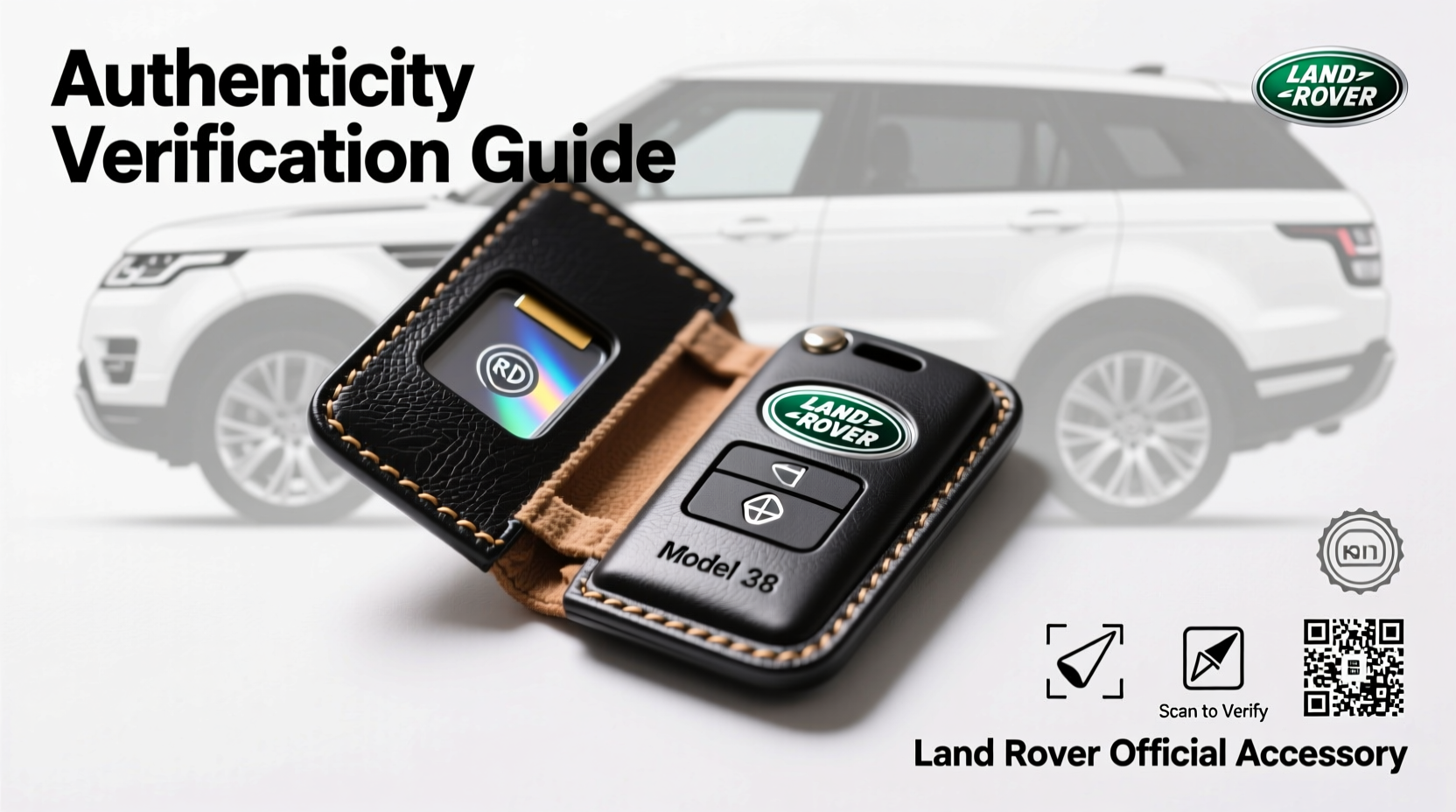When you own a Land Rover, every detail matters—from the engineering precision under the hood to the craftsmanship of accessories like your key case. The key fob is more than just a tool for unlocking your vehicle; it’s a secure gateway embedded with advanced technology. Unfortunately, counterfeit key cases have flooded online marketplaces and third-party retailers, often compromising both functionality and safety. Buying a fake or replica key case may seem cost-effective at first, but it can lead to poor durability, signal interference, or even unauthorized access to your vehicle. This guide provides clear, actionable steps to help you verify whether your Land Rover key case is genuine—whether you’re buying new, replacing a lost fob, or inspecting an existing one.
Why Authenticity Matters for Your Land Rover Key Case

The Land Rover key fob is engineered to work seamlessly with your vehicle’s immobilizer and remote locking systems. A counterfeit version may not communicate properly with your car’s onboard computer, resulting in failed starts, intermittent lock/unlock issues, or battery drain. Worse, some fake keys lack encrypted pairing protocols, making them vulnerable to relay attacks—a growing concern among luxury vehicle owners.
Land Rover uses rolling-code encryption and proximity sensors that are difficult to replicate without manufacturer authorization. Genuine key cases are built to withstand daily wear, moisture exposure, and temperature extremes. They also carry traceable serial numbers and are programmed using dealer-level diagnostic tools. Counterfeit versions often skip these safeguards, putting your vehicle—and investment—at risk.
“Using non-genuine key fobs can compromise vehicle security and void certain warranty protections related to electronic systems.” — David Reynolds, Automotive Security Analyst at VehiLock Solutions
Step-by-Step Guide to Verifying Your Land Rover Key Case
Authenticating your key case doesn’t require specialized equipment. With careful observation and methodical checks, you can identify red flags before they become problems.
- Inspect the Build Quality and Materials
Genuine Land Rover key cases use high-grade ABS plastic or metal alloys with precise molding. Run your fingers over the surface—authentic units feel solid, with no rough edges, visible seams, or uneven paint. The Land Rover logo should be sharply embossed, not stickered or painted on. - Check the Logo and Branding Details
Look closely at the emblem. On real key cases, the Land Rover script is centered, evenly spaced, and consistent in font weight. Counterfeits often display misaligned logos, incorrect proportions, or blurred lettering. The word “LAND ROVER” should appear exactly as branded—no misspellings or odd capitalization. - Examine Button Placement and Functionality
The buttons (lock, unlock, boot release, panic) should have a firm, responsive click. On fake models, buttons are often too soft, sticky, or misaligned. Test each function: if the response is delayed or inconsistent, the internal circuitry may be substandard. - Verify Weight and Balance
Genuine key fobs have a noticeable heft due to internal shielding and quality components. Counterfeits tend to feel lightweight or hollow. Compare it to a known authentic unit if possible. - Scan for Embedded RFID or NFC Tags
Many modern Land Rover keys include passive RFID chips for keyless entry. Use an NFC reader app on your smartphone to check for a readable tag. While this won’t confirm authenticity alone, the absence of a chip in a model that should have one is a major warning sign. - Test Vehicle Response and Pairing Process
If you’ve recently acquired the key, observe how it pairs with your vehicle. Genuine keys sync quickly through the ignition or OBD-II port using official software. Fakes often fail during programming or require manual button sequences that aren’t part of standard procedures.
Common Red Flags: What to Watch For
Not all counterfeit keys are obvious at first glance. Some are convincingly packaged and sold on reputable platforms. Use the following checklist to catch telltale signs of a fake.
- Packaged in generic plastic clamshells instead of branded boxes
- Missing holographic stickers or security labels on packaging
- No part number or an incorrect OEM number (e.g., LR053245, LRC000123)
- Inconsistent weight compared to factory originals
- Buttons labeled incorrectly (e.g., “Trunk” instead of “Boot” in UK/EU models)
- Sold significantly below market price (more than 40% off retail)
- Vague product descriptions like “compatible with Land Rover” instead of “genuine OEM”
Do’s and Don’ts When Buying a Replacement Key Case
| Do’s | Don’ts |
|---|---|
| Buy from authorized Land Rover dealers or certified online retailers | Order from unknown sellers on auction sites with no reviews |
| Ask for proof of authenticity, such as a certificate of origin | Assume a seller is trustworthy because the listing looks professional |
| Verify the OEM part number matches your model year and trim | Use universal aftermarket shells that claim to fit “all Range Rovers” |
| Have the key programmed by a dealership or mobile locksmith with JLR software | Attempt DIY programming without proper tools—this can lock out your ECU |
Real Example: How One Owner Avoided a Costly Mistake
James T., a Discovery Sport owner from Manchester, purchased what appeared to be a genuine replacement key case from an online marketplace for £45—less than half the dealer price. Upon inspection, he noticed the logo was slightly skewed and the unlock button required two presses to work. He contacted his local Land Rover service center, where a technician scanned the key and found it lacked a valid transponder ID. The internal board used generic Chinese microchips incompatible with JLR’s SDD (Software Development Diagnostics). After investing in a genuine OEM unit (£128), James had it programmed in under 15 minutes. His advice? “If the price seems too good to be true, it probably isn’t genuine. Save up and go through official channels.”
Frequently Asked Questions
Can I replace just the key case shell without changing the electronics?
Yes, if the internal circuit board and transponder are intact, you can purchase a genuine replacement shell and transfer the internals. However, only do this with OEM parts to maintain water resistance and structural integrity.
How much does a genuine Land Rover key case cost?
Prices vary by model and year. Shell-only replacements range from £75 to £110. Complete programmed keys (including blade and electronics) typically cost between £180 and £300 at dealerships.
Will my insurance cover a counterfeit key if my car is stolen?
Some insurers may deny claims if a vehicle is compromised due to non-OEM modifications or accessories deemed to weaken security. Always disclose the use of aftermarket parts.
Final Checklist Before You Buy
- ✅ Confirm the correct OEM part number for your vehicle’s model and year
- ✅ Inspect packaging for Land Rover branding and security seals
- ✅ Feel the weight and finish—does it match your original?
- ✅ Verify the seller is an authorized distributor or has verifiable credentials
- ✅ Ensure professional programming will be available after purchase
Conclusion: Protect Your Investment with Confidence
Your Land Rover is engineered for performance, luxury, and long-term reliability. Don’t let a seemingly minor component like a key case undermine that standard. Verifying authenticity takes only a few minutes but can prevent months of frustration, security risks, and unexpected repair costs. Whether you're replacing a lost key or upgrading your setup, prioritize quality over convenience. Stick to trusted sources, trust your instincts when something feels off, and never hesitate to consult a Land Rover specialist. By taking these steps, you ensure your vehicle remains as secure and sophisticated as the day it left the factory.









 浙公网安备
33010002000092号
浙公网安备
33010002000092号 浙B2-20120091-4
浙B2-20120091-4
Comments
No comments yet. Why don't you start the discussion?